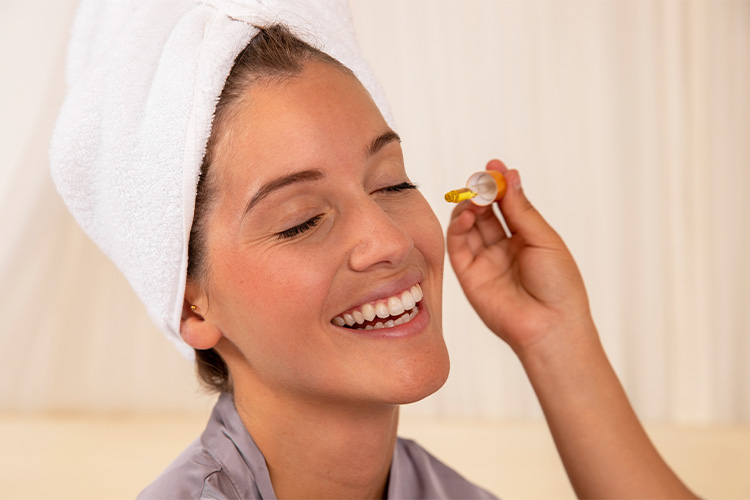
What is Vitamin E?
Vitamin E is a fat-soluble vitamin with powerful antioxidant properties. In skincare, its form called tocopherol is commonly used. It can be found in both natural and synthetic forms and is typically included in skincare products as capsules, oils, or creams.
What Are the Benefits of Vitamin E for the Skin?
1. Antioxidant Protection
Vitamin E protects skin cells from oxidative stress. Environmental factors such as harmful UV rays from the sun, air pollution, and cigarette smoke cause the formation of free radicals in the skin. Vitamin E neutralizes these harmful effects.
2. Delays Skin Aging
With regular use, Vitamin E can reduce the appearance of wrinkles and support a younger-looking complexion. It boosts collagen production, thereby increasing skin elasticity.
3. Moisturizing Effect
Vitamin E helps maintain the skin's moisture levels and prevents dryness. It provides a soothing effect, especially for dry and sensitive skin.
4. Protection Against Sun Damage
When used in conjunction with sunscreen, it can reduce UV-induced skin damage. It also helps alleviate irritation caused by sunburns.
5. Supports Wound and Scar Healing
Vitamin E contributes to faster healing of scars and acne marks by accelerating cell regeneration.
How to Use Vitamin E?
1. Direct Skin Application
You can cut open Vitamin E capsules and apply their content directly to your skin. Nighttime use is generally recommended.
2. Skincare Products Containing Vitamin E
Vitamin E can be found in products such as serums, creams, or moisturizers. Make sure to choose a product suitable for your skin type.
3. Dietary Intake
By consuming foods rich in Vitamin E (such as almonds, hazelnuts, spinach, avocado), you can support both your general health and skin health.
What Are the Possible Side Effects of Vitamin E?
Vitamin E is generally a safe ingredient, but side effects can be observed in some cases. If any side effects occur, discontinue use of the product and consult a dermatologist.
-Allergic reactions: Redness, itching, or irritation.
-Acne formation in oily skin: Should be used carefully as it can clog pores.
-Toxic effect from excessive use: A risk of toxicity may arise when taken in high doses orally.
What Should Be Considered When Using Vitamin E for Skin?
1. Pay Attention to the Form of Vitamin E
Vitamin E used in skincare products generally comes in two different forms:
-Tocopherol: This is the natural form, which is more easily absorbed by the skin.
-Tocopheryl Acetate: This is a stabilized synthetic form that extends product shelf life but is absorbed more slowly compared to the natural form.
If the product label states "Tocopherol," it indicates that it contains natural Vitamin E and is generally more effective.
2. Suitability for Your Skin Type is Important
-Dry skin: Creams containing Vitamin E that provide intense hydration can be preferred.
-Oily and acne-prone skin: Lightweight, water-based products should be used, as concentrated Vitamin E can clog pores.
-Sensitive skin: Products free of perfumes, alcohol, and preservatives should be chosen.
3. Pay Attention to Packaging Structure
Vitamin E is sensitive to light and air. It can lose its effectiveness in unsuitable packaging. Therefore, products sold in opaque and airtight containers should be preferred. Pump or tube packaging helps the product stay fresh longer.
4. Read the Product Ingredients and Label
The general ingredient list is also important for products containing Vitamin E. When purchasing, check:
-Whether it contains comedogenic (pore-clogging) ingredients,
-Whether it contains irritating substances like parabens, sulfates, or synthetic fragrances,
-Whether the product has undergone dermatological testing.
5. Check Expiration Date and Shelf Life
The product's expiration date must be checked. After opening, try to use it within 6-12 months; products that have changed color, smell, or texture should not be used.
Myths and Facts About Vitamin E for Skin
Myth 1: Vitamin E is Suitable for All Skin Types
Fact: Its effect can vary by skin type. Although Vitamin E is a beneficial ingredient for the skin, in oily and acne-prone skin, it can clog pores and lead to acne. Dry and sensitive skin types may benefit more from Vitamin E.
Myth 2: Vitamin E Can Be Used as a Sunscreen
Fact: Vitamin E alone does not provide sun protection. Vitamin E plays a restorative role against the harmful effects of the sun on the skin but does not have a sun-blocking effect. Using a product without SPF just because it contains Vitamin E can leave your skin vulnerable to UV damage.
Myth 3: Using Vitamin E Every Day Is More Effective
Fact: Excessive use can cause skin irritation. Since Vitamin E is a rich ingredient, applying it directly every day can cause oiliness, redness, or irritation in some skin types. This effect is especially seen with the use of pure Vitamin E oil.
Myth 4: Vitamin E Eliminates All Skin Blemishes
Fact: It can be effective but doesn't work miracles alone. Vitamin E supports skin regeneration and can reduce the appearance of some blemishes, but it is not sufficient on its own for problems like deep sunspots or melasma. Dermatological treatment may be necessary for such conditions.
Myth 5: The More Concentrated a Vitamin E Product Is, the More Effective It Is
Fact: Formulation, not concentration, is important. Products with a high percentage of Vitamin E can cause skin irritation or clogged pores. The product's formulation, its balance with other active ingredients, and its skin compatibility are more decisive.
Myth 6: Using Vitamin E for Wrinkles Is Sufficient
Fact: Anti-aging care should be multifaceted. Vitamin E can reduce the appearance of fine lines by increasing skin elasticity, but it does not provide anti-wrinkle care on its own. It is more effective when used in conjunction with other anti-aging ingredients such as retinol, peptides, and hyaluronic acid.



